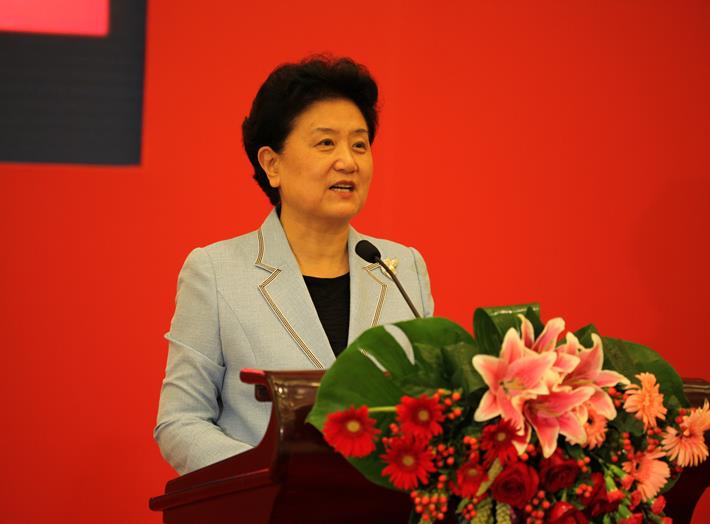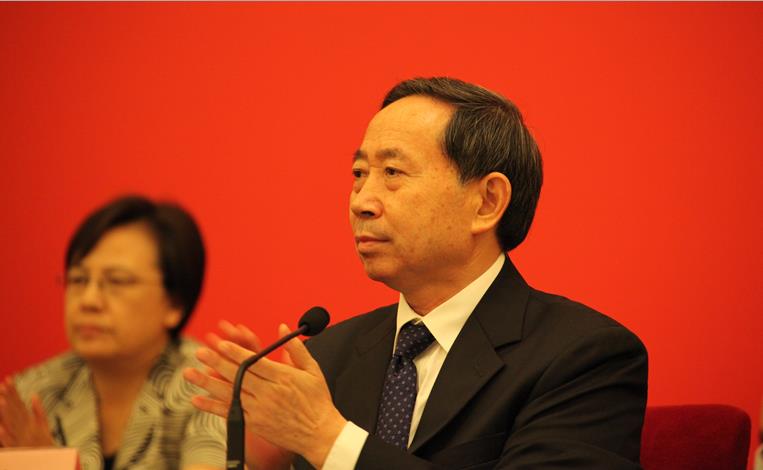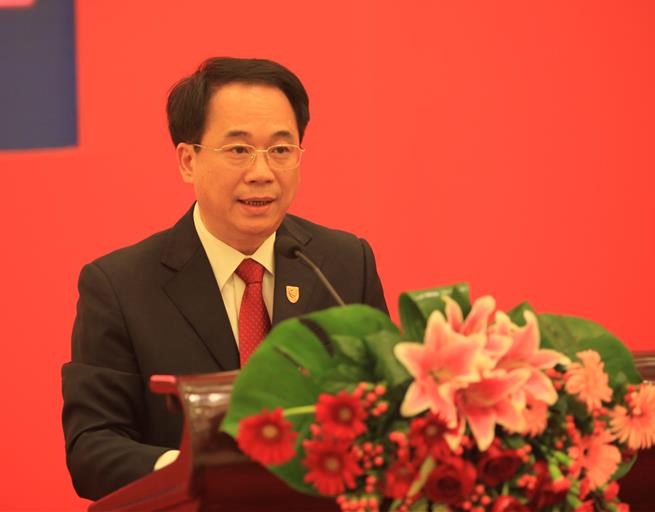 On 31st July, 2012, the Open University of China (OUC) was officially inaugurated at the Great Hall of the People in Beijing. Liu Yandong, member of the Political Bureau of the CPC Central Committee and state councillor, unveiled the OUC and delivered an important speech entitled Striving to Successfully Run an Open University with Chinese Characteristics.
On 31st July, 2012, the Open University of China (OUC) was officially inaugurated at the Great Hall of the People in Beijing. Liu Yandong, member of the Political Bureau of the CPC Central Committee and state councillor, unveiled the OUC and delivered an important speech entitled Striving to Successfully Run an Open University with Chinese Characteristics.

The Official Inauguration of the Open University of China at the Great Hall of the People.

Liu Yandong, member of the Political Bureau of the CPC Central Committee and state councillor, unveiling the Open University of China and delivering a speech entitled Striving to Successfully Run an Open University with Chinese Characteristics.
Liu Yandong spoke highly of the RTVUs’ contributions to China’s educational development. She said that great attention had been paid to the RTVU, the predecessor of the Open University, by the previous leaders of the CPC Central Committee and the State Council ever since its establishment. After more than 30 years of development, a distance higher education university system dominated by the RTVUs and covering urban and rural areas has been built, a large number of practical, talented professionals have been cultivated, and the all-round development and modernisation of China has been promoted.
Firstly, an open distance education university system covering urban and rural areas in China has been built; secondly, an open university system that allows for the participation of all members of society has been formed; thirdly, a host of practical, talented professionals have been trained, a total of more than 9.5 million learners have completed junior college programme education and undergraduate programme education, and over 60 million non-degree education trainings have been given; fourthly, an important role has been played in narrowing the education gap and promoting educational equity.
Liu Yandong pointed out that in the current climate, education was experiencing, transitioning from limited closed campuses to the integration of society, from a focus on school-age education to lifelong education serving lifelong learning and development, from education of the few to education of all, and from professional education to diverse education. Open education has become a worldwide trend. The OUC symbolises a significant strategic transition to meet economic and social development needs and the all-round development of society. It is an arduous task for open universities to fulfil their new mission and new duty.
According to Liu Yandong, the modern open universities built on the basis of the RTVUs are an important channel to satisfy the diverse learning needs of the people, promote educational equality, overcome the disadvantages of examination-oriented education, and carry out quality education. They are important support mechanism for the construction of a lifelong learning education system and the formation of a learning-oriented society. They are prominent measures to support national development and improve the quality of the entire nation. Liu Yandong underlined that open university construction should follow scientific orientation, highlight operational distinction, focus on achieving the extension of campus education into society, give equal priority to degree education and non-degree education, and build an effective “bridge” connecting regular universities by way of credit transfer. Reform of the university operation model and learner development model should be deepened to set up a strict but flexible teaching management system and a system of tolerant entrance and strict graduation, in order to make registration, learning, and examinations more flexible and convenient, improve the quality assurance system, and raise education quality in an all-round way. Further integration of information technology and education and teaching will be made in order to improve the teaching model with learner-centric and web-based autonomous learning, integrated distance support, and face-to-face tutorials. The building and sharing of quality education resources should be accelerated in an effort to expand the categories, amount, and coverage of quality resources, and to give more and better education support to a number of different groups including, in particular, grassroots learners. International exchange and cooperation should be strengthened in order to absorb advanced concepts and experience from around the world and continue to increase the universities operating level and global impact.

Then minister of the Ministry of Education (MOE) Yuan Guiren presiding over the meeting

OUC president Yang Zhijian delivering a speech
According to OUC president Yang Zhijian, the establishment of the OUC is not the end of the RTVU’s mission but rather a new historical starting point. The OUC, as a new type of university, should emancipate the mind, deepen reform, and commit to innovation during this process. The OUC should explore four different aspects. The first is to meet the needs of building a learning-oriented society for all to probe the construction of a new type of fenceless university that is oriented towards all members of society, takes “openness, responsibility, quality, diversity, and internationalisation” as its operating vision, covers both urban and rural areas, implements a registration-based entrance system, provides all members of society with flexible, diversified and individualized learning conditions, and promotes educational equality by paying attention to special regions and groups; the second is to adapt to the development trend of modern information technology to explore the establishment of a new type of university that follows the need-guided and application-incepted basic thought of coordinated innovation, takes as its value orientation the achievement of better quality, bigger scale, and lower costs, focuses on the building of online core courses, student spaces, teaching teams, learning assessments, and Confucius institutes, achieves the complete support of modern information technology, and deeply integrates technology and education; the third is to adapt to the development trends of socio-economic development and educational reform in order to the establishment of a new type of university that prioritises both degree education and non-degree education, makes the cultivation of practical professionals its objective, centres on the improvement of learner formation quality, implements a new type of learning model combining online autonomous learning, distance learning support, and face-to-face tutorials, and provides vocational training, community education, old-age education, and civic quality education; the fourth is to meet the needs of building a lifelong learning “bridge” by exploring the construction of a new type of university that seizes the opportunity for credit bank construction, promotes connection and communication between various kinds of education at all levels, enables the authentication, accumulation, and transfer of various learning results, and promotes the formulation of a lifelong education system.
Also during the meeting, Beijing RTVU and Shanghai RTVU were renamed Beijing Open University and Shanghai Open University, respectively. The two open universities serve local economic development and urban development.
Then minister of the MOE Yuan Guiren presided over the meeting. Present at the meeting were vice secretary-general Jiang Xiaojuan of the State Council, deputy director Hu Zucai of the National Development and Reform Commission, leader Hao Keming of the Lifelong Education System and Mechanism Construction Group of the National Education Advisory Committee, then vice mayor of Beijing Municipality Hong Feng, then vice mayor of Shanghai Municipality Shen Xiaoming, and vice minister of the MOE Du Zhanyuan. A total of 400 people attended the meeting, including relevant experts from the Lifelong Education System and Mechanism Construction Group of the National Education Advisory Committee, responsible personnel from the National Leading Group Office for Reform in the Education System, relevant departments and bureaus and directly affiliated institutions, leaders and staff representatives of the three open universities, the CCRTVU Bayi School, Zongcan School, School for the Air Force, the School of Tibet, and the School for the Disabled, and representatives from universities, industries, enterprises, and city support alliances.
By Yan Jingzhen, www.china.org.cn